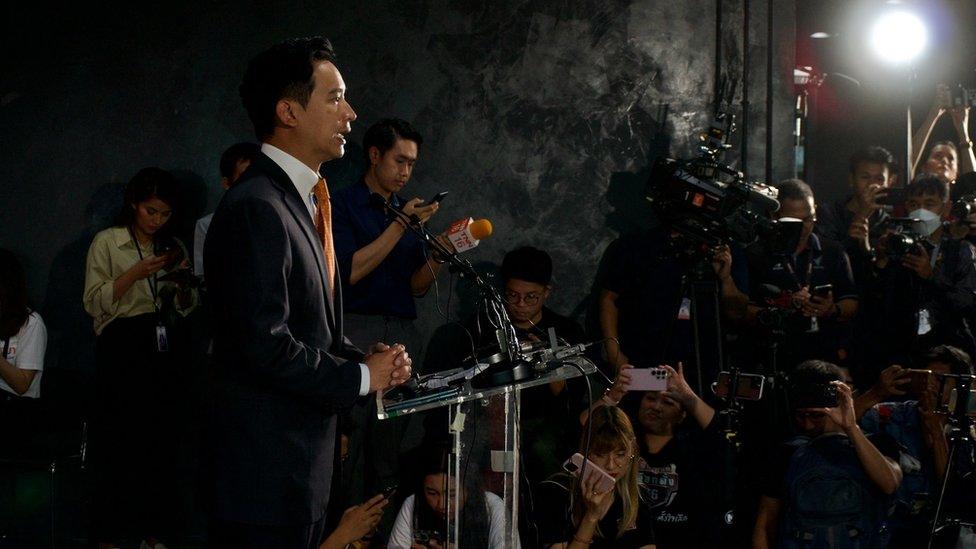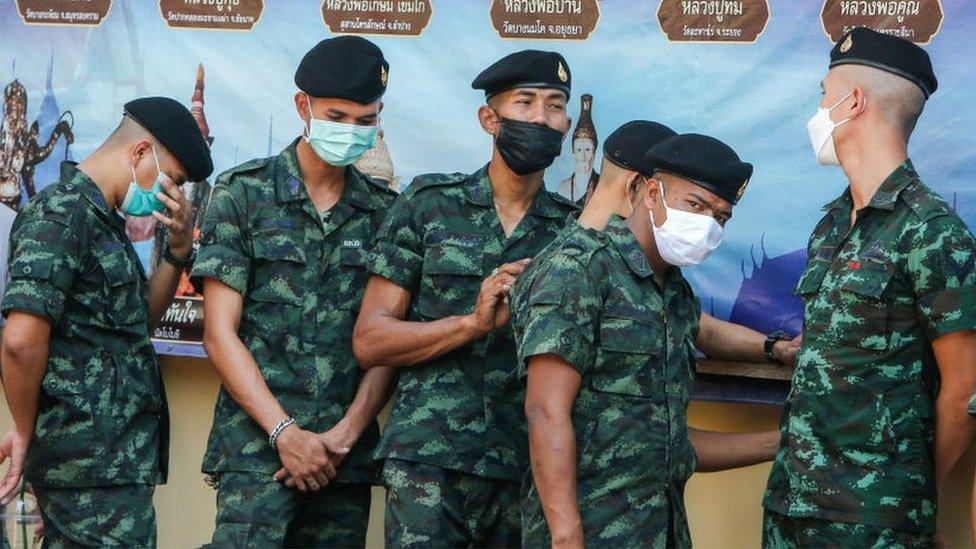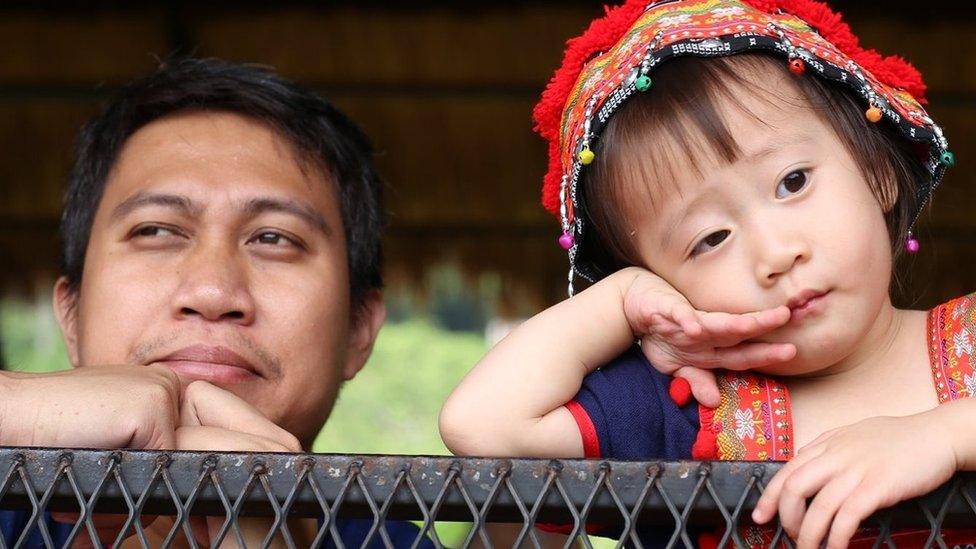Thailand elections: Voters deliver stunning blow to army-backed rule
- Published
Watch: Gifts and cheers for the man wanting to reform Thailand
Thai voters have delivered a stunning verdict in favour of an opposition party that is calling for radical reform of the country's institutions.
Early results show Move Forward exceeding every prediction to win 151 of the 500 seats in the lower house.
It's now 10 seats ahead of what was the frontrunner, Pheu Thai, led by ex-prime minister Thaksin Shinawatra's daughter.
Analysts are calling this a political earthquake that represents a significant shift in public opinion.
It is also a clear repudiation of the two military-aligned parties of the current government, and Prime Minister Prayuth Chan-ocha, who led a coup that ousted an elected government in 2014. The governing coalition won only 15% of the seats.
"We didn't leave any stones unturned," Move Forward's 42-year-old leader Pita Limjaroenrat told the BBC. "People have had enough in the last decade. Now, it's a new day."
Pheu Thai, the second-largest party, has said it has agreed to join Move Forward and four smaller opposition parties, giving them a coalition of more than 60% of seats in the new parliament.
However, that still isn't enough to outvote the 250-strong unelected senate, which was appointed by Mr Prayuth, and are allowed to join the vote in parliament for the next administration. They are likely to object to Move Forward's progressive agenda, in particular its pledge to amend the controversial lese majeste law.
In the political negotiations which lie ahead, many Thais fear the military and its backers may yet try to block the winning parties from taking office. A military coup is unlikely, but yet another court ruling to disqualify Move Forward on a technicality, as happened to its predecessor Future Forward in 2020, is possible.

Mr Pita addressing the media on Monday
The other question is how well Move Forward and Pheu Thai, whose relations in the last parliament were sometimes fractious, can work together. Mr Pita, a Harvard University graduate and a skilled parliamentarian, is still untested in the more ruthless art of stitching together and sustaining a coalition.
But that uncertainty doesn't change the fact that the people of Thailand woke up to a changed political landscape this morning.
"The majority of votes reflect the need to escape from the 'Prayuth regime', and the yearning for change," says Prajak Kongkirati, a political scientist from Thammasat University. "It shows that people believe in the Move Forward demand for change - many more people than predicted."
Thai social media has been awash with victory messages from Move Forward supporters, who call themselves "organic canvassers", and describe the party's win as a "wind of change" and the "dawn of a new era."
Mr Pita tweeted that he was "ready" to become the country's 30th prime minister. "We have the same dreams and hopes. And together we believe that our beloved Thailand can be better, and changes are possible if we start working on them today," he wrote.
"This election really tells you that only four years have passed, but the people's thinking has changed a lot, both the establishment and the pro-democracy camps," a tweet read, adding that, "democracy cannot be taken for granted".
It would have once been unthinkable that Move Forward, a party calling for wholesale changes to Thailand's bureaucracy, its economy, the role of the military, and even the laws protecting the monarchy, could win more seats and votes than any of its rivals.

Social media is full of Thais taking "big steps" as a show of support for Move Forward
It's no coincidence that these were the same issues that spurred a months-long student-led protest movement in 2020. Some of Move Forward's candidates had been leaders in the movement. And, like the 2020 protests, young and passionate voters, many of them followers of Move Forward, played a big role in the election result.
The mood in favour of the young party was hard to miss in the weeks leading up to the election. A new wave of memes exploded on Thai social media - people taking big steps or leaps in an obvious nod to Move Forward's Thai name.
And that played out in real life at voting booths on Sunday as people took exaggerated, giant steps to show their support. It was the only way to indicate which way they were leaning because election rules don't allow voters to declare their preferences openly. Others wore bright orange shirts, flip flops and sneakers - the party's chosen colour for campaigning.
Move Forward's candidates had fewer resources than their rivals, and had to rely on social media, and sometimes old technology like bicycles, to get their message across. It helped that their vision seemed much clearer than other parties.
Move Forward ruled out any coalition with parties associated with the 2014 military coup, a position on which its reformist rival Pheu Thai was initially evasive. The party was also fresh and bold, and in the last parliament, was known for taking principled positions.

The vote is also a rejection of nearly a decade of military-backed rule
It also benefitted from what appears to be a widespread public appetite for change. Voters under 26 years are not a large bloc in ageing Thailand - they make up just 14% of the 52-million electorate - but they worked hard to persuade older voters to back Move Forward to offer their generation a better future.
The most immediate question is whether, despite the mandate for change, the two reformist parties are allowed to form a government.
Mr Pita was optimistic while addressing the media on Monday. "With the consensus that came out of the election, it will be quite a hefty price to pay for someone who is thinking of abolishing the election results or forming a minority government... it is quite far-fetched for now," he said.
"And I think the people of Thailand will not allow that to happen."
Additional reporting by Thanyarat Doksone
- Published29 April 2023

- Published30 March 2023

- Published8 March 2023
